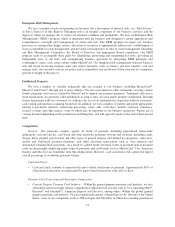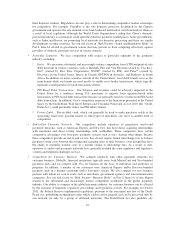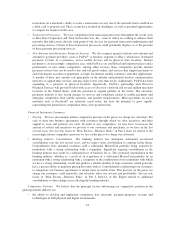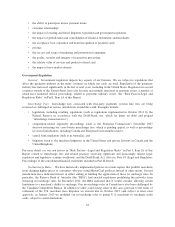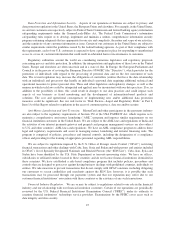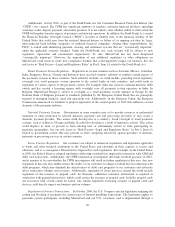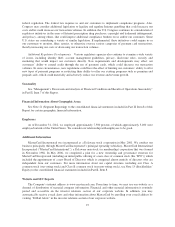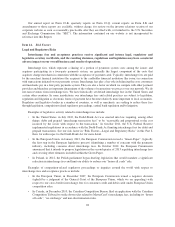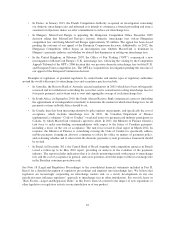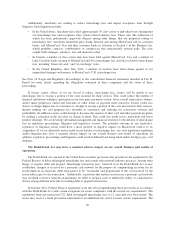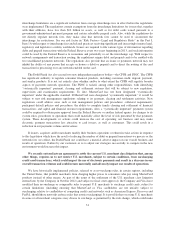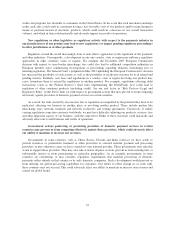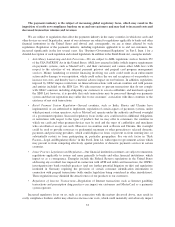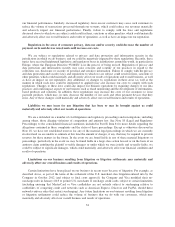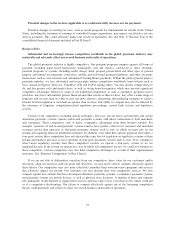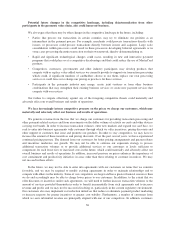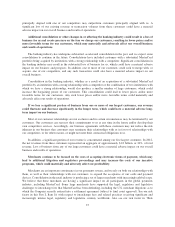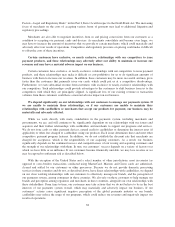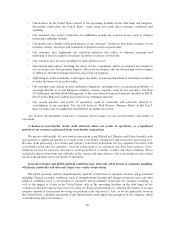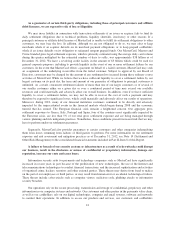MasterCard 2012 Annual Report Download - page 35
Download and view the complete annual report
Please find page 35 of the 2012 MasterCard annual report below. You can navigate through the pages in the report by either clicking on the pages listed below, or by using the keyword search tool below to find specific information within the annual report.interchange limitations are a significant reduction from average interchange fees in effect before the regulations
were implemented. The regulations contain exemptions from the interchange limitations for issuers that, together
with their affiliates, have less than $10 billion in assets, as well as for debit cards issued pursuant to a
government-administered payment program and certain reloadable prepaid cards. Also, while the regulations do
not directly regulate network fees, they make clear that network fees cannot be used to circumvent the
interchange fee restrictions. See our risk factor in “Risk Factors—Legal and Regulatory Risks” in this Part I,
Item 1A with respect to interchange fees and related practices receiving significant and increasingly intense legal,
regulatory and legislative scrutiny worldwide. Issuers are required to file various types of information regarding
debit and prepaid transactions with the Federal Reserve every two years beginning in 2013, and such information
could be used by the Federal Reserve to reexamine and potentially re-set the interchange cap. With respect to
network arrangements and transaction routing, the regulations require debit and prepaid cards to be enabled with
two unaffiliated payments networks. The regulations also provide that an issuer or payments network may not
inhibit the ability of any person that accepts or honors a debit or prepaid card to direct the routing of the card
transaction for processing over any network enabled on the card.
The Dodd-Frank Act also created two new independent regulatory bodies—the CFPB and FSOC. The CFPB
has significant authority to regulate consumer financial products, including consumer credit, deposit, payment,
and similar products. It is not yet entirely clear whether and/or to what extent the CFPB will regulate broader
aspects of payments network operations. The FSOC is tasked, among other responsibilities, with identifying
“systemically important” payment, clearing and settlement systems that will be subject to new regulation,
supervision and examination requirements. To date, MasterCard has not been designated “systemically
important” under the applicable standard. If MasterCard were designated “systemically important,” it would be
subject to new risk management regulations relating to its payment, clearing and settlement activities. New
regulations could address areas such as risk management policies and procedures; collateral requirements;
participant default policies and procedures; the ability to complete timely clearing and settlement of financial
transactions; and capital and financial resource requirements. Also, a “systemically important” payments system
could be required to obtain prior approval from the Federal Reserve or another federal agency for changes to its
system rules, procedures or operations that could materially affect the level of risk presented by that payments
system. These developments or actions could increase the cost of operating our business and may make
electronic payment transactions less attractive to card issuers, as well as consumers. This could result in a
reduction in our payments volume and revenues.
If issuers, acquirers and/or merchants modify their business operations or otherwise take actions in response
to this legislation which have the result of reducing the number of debit or prepaid transactions we process or the
network fees we collect, the Dodd-Frank Act could have a material adverse impact on our overall business and
results of operations. Failure by our customers or us to adjust our strategies successfully to compete in the new
environment would increase this impact.
We recently entered into an agreement to settle the current U.S. merchant class litigation that, among
other things, requires us to not restrict U.S. merchants, subject to certain conditions, from surcharging
credit card transactions, which could impact the use of electronic payments and result in a decrease in our
overall transaction volumes and could in turn materially and adversely impact our results of operations.
We have historically implemented policies, referred to as no-surcharge rules, in certain regions, including
the United States, that prohibit merchants from charging higher prices to consumers who pay using MasterCard
products instead of other means. As part of the terms of the settlement of the U.S. merchant class litigation
entered into by the Company in October 2012 (and subject to final court approval), the Company and Visa have
modified their no-surcharge or comparable rules to permit U.S. merchants to surcharge credit cards, subject to
certain limitations (including ensuring that MasterCard or Visa cardholders are not unfairly subject to
surcharging relative to cardholders of competing credit card networks such as American Express, Discover and
PayPal, should those networks enforce rules that restrict surcharging). It is possible that over time U.S. merchants
in some or all merchant categories may choose to surcharge as permitted by the rule change, which could make
31


